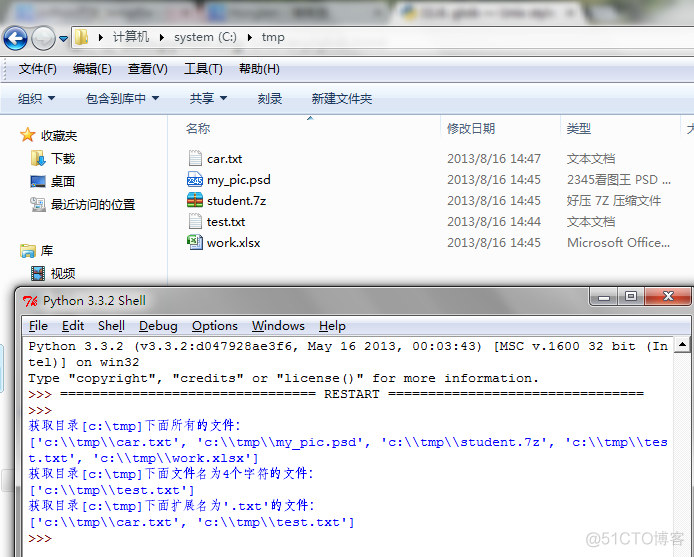'''python中,glob模块是用来查找匹配的文件的 在查找的条件中,需要用到Unix shell中的匹配规则: * : 匹配所所有 ? : 匹配一个字符 *.* : 匹配如:[hello.txt,cat.xls,xxx234s.doc] ?.* : 匹配如:[1
在查找的条件中,需要用到Unix shell中的匹配规则:
* : 匹配所所有
? : 匹配一个字符
*.* : 匹配如:[hello.txt,cat.xls,xxx234s.doc]
?.* : 匹配如:[1.txt,h.py]
?.gif: 匹配如:[x.gif,2.gif]
可以参考:fnmatch
如果没有匹配的,glob.glob(path)将返回一个空的list:[]
'''
以下是我的demo
运行效果:

=============================================
代码部分:
=============================================
#python glob'''
10 11 12
13 14 '''
15 import16
17 def18 '''获取目录[c:\\tmp]下面所有的文件'''
19 return glob.glob('c:\\tmp\\*.*')
20
21 def22 '''获取目录[c:\\tmp]下面文件名为4个字符的文件'''
23 return glob.glob('c:\\tmp\\????.txt')
24
25 def26 '''获取目录[c:\\tmp]下面扩展名为\'.txt\'的文件'''
27 return glob.glob('c:\\tmp\\*.txt')
28
29 def30 print('获取目录[c:\\tmp]下面所有的文件:')
31 tem_files =32 print(tem_files)
33 print('获取目录[c:\\tmp]下面文件名为4个字符的文件:')
34 tem_files =35 print(tem_files)
36 print('获取目录[c:\\tmp]下面扩展名为\'.txt\'的文件:')
37 tem_files =38 print(tem_files)
39
40 if __name__ == '__main__':
41 main()
